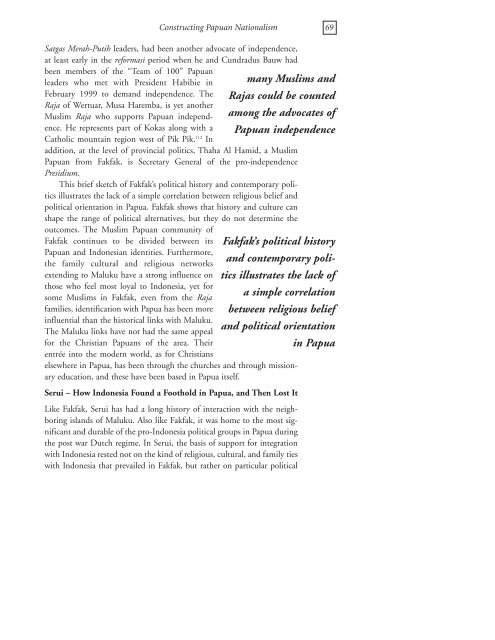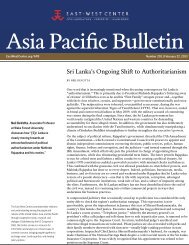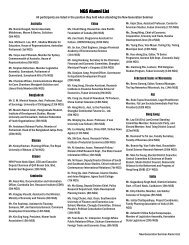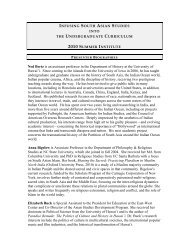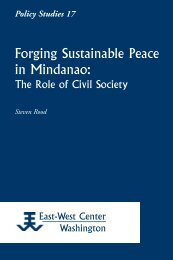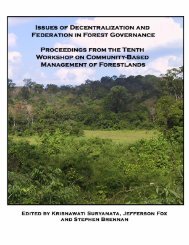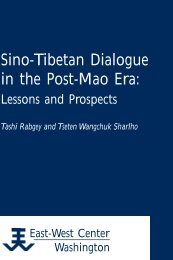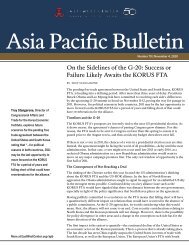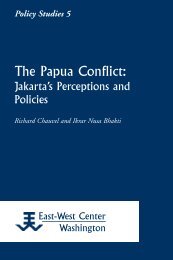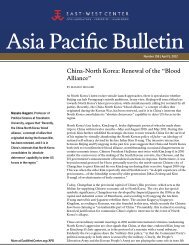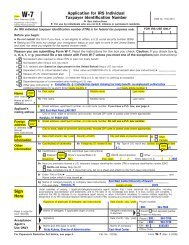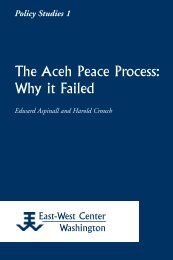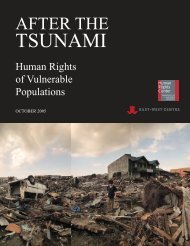Constructing Papuan Nationalism: History, Ethnicity ... - ScholarSpace
Constructing Papuan Nationalism: History, Ethnicity ... - ScholarSpace
Constructing Papuan Nationalism: History, Ethnicity ... - ScholarSpace
- No tags were found...
Create successful ePaper yourself
Turn your PDF publications into a flip-book with our unique Google optimized e-Paper software.
<strong>Constructing</strong> <strong>Papuan</strong> <strong>Nationalism</strong> 69Satgas Merah-Putih leaders, had been another advocate of independence,at least early in the reformasi period when he and Cundradus Bauw hadbeen members of the “Team of 100” <strong>Papuan</strong>leaders who met with President Habibie inFebruary 1999 to demand independence. TheRaja of Wertuar, Musa Haremba, is yet anotherMuslim Raja who supports <strong>Papuan</strong> independence.He represents part of Kokas along with aCatholic mountain region west of Pik Pik. 112 Inaddition, at the level of provincial politics, Thaha Al Hamid, a Muslim<strong>Papuan</strong> from Fakfak, is Secretary General of the pro-independencePresidium.This brief sketch of Fakfak’s political history and contemporary politicsillustrates the lack of a simple correlation between religious belief andpolitical orientation in Papua. Fakfak shows that history and culture canshape the range of political alternatives, but they do not determine theoutcomes. The Muslim <strong>Papuan</strong> community ofFakfak continues to be divided between its<strong>Papuan</strong> and Indonesian identities. Furthermore,the family cultural and religious networksextending to Maluku have a strong influence onthose who feel most loyal to Indonesia, yet forsome Muslims in Fakfak, even from the Rajafamilies, identification with Papua has been moreinfluential than the historical links with Maluku.The Maluku links have not had the same appealfor the Christian <strong>Papuan</strong>s of the area. Theirentrée into the modern world, as for Christianselsewhere in Papua, has been through the churches and through missionaryeducation, and these have been based in Papua itself.many Muslims andRajas could be countedamong the advocates of<strong>Papuan</strong> independenceFakfak’s political historyand contemporary politicsillustrates the lack ofa simple correlationbetween religious beliefand political orientationin PapuaSerui – How Indonesia Found a Foothold in Papua, and Then Lost ItLike Fakfak, Serui has had a long history of interaction with the neighboringislands of Maluku. Also like Fakfak, it was home to the most significantand durable of the pro-Indonesia political groups in Papua duringthe post war Dutch regime. In Serui, the basis of support for integrationwith Indonesia rested not on the kind of religious, cultural, and family tieswith Indonesia that prevailed in Fakfak, but rather on particular political


